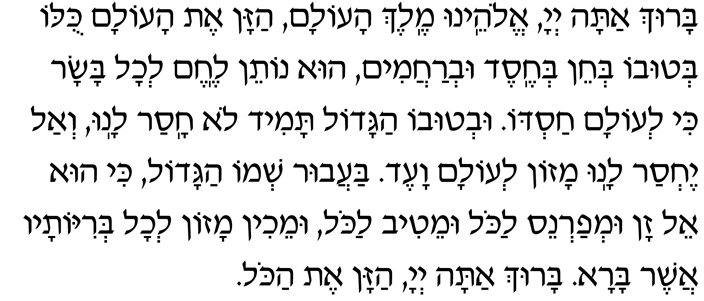


God's goodness: A blessing of thanks for God's goodness, written by Rabban Gamliel in Yavneh.Jerusalem: Concerns Jerusalem, is ascribed to David, who established it as the capital of Israel and Solomon, who built the Temple in Jerusalem.The land: A blessing of thanks for the Land of Israel, is attributed to Joshua after he led the Jewish people into Israel.The food: A blessing of thanks for the food was traditionally composed by Moses ( Berakhot 48b) in gratitude for the manna which the Children of Israel ate in the wilderness during the Exodus from Egypt.The first three blessings are regarded as required by scriptural law: The process is often referred to as bentsching the word "bentsch" means to bless.īirkat Hamazon is made up of four blessings. The scriptural source for the requirement to recite a blessing after a meal is Deuteronomy 8:10 "When you have eaten and are satisfied, you shall bless the L ORD your God for the good land which He gave you". The length of the different brakhot hamazon can vary considerably, from bentsching in under half a minute to more than five minutes. The blessing can be found in almost all siddurs and is often printed in a variety of artistic styles in a small booklet called a birchon (or birkon, בִּרְכּוׂן) in Hebrew or bencher (or bentscher) in Yiddish. Įxcept in teaching situations, Birkat Hamazon is typically read individually after ordinary meals. It is a matter of rabbinic dispute whether Birkat Hamazon must be said after eating certain other bread-like foods such as pizza. īirkat Hamazon is recited after a meal containing bread or similar foods that is made from the five grains, with the exception of bread that comes as a dessert ( pas haba'ah b'kisanin) and food that does not possess the form or appearance of bread ( torisa d'nahama), in which case a blessing that summarizes the first three blessings ( birkat me'ein shalosh) is recited instead. It is understood as a mitzvah (Biblical commandment) based on Deuteronomy 8:10. The start of the blessing, in a siddur from the city of Fürth, 1738īirkat Hamazon ( Hebrew: בִּרְכַּת הַמָּזוׂן, romanized: birkath hammāzôn "The Blessing of the Food"), known in English as the Grace After Meals ( Yiddish: בענטשן, romanized: benchen "to bless", Yinglish: Bentsching), is a set of Hebrew blessings that Jewish law prescribes following a meal that includes at least a kezayit (olive-sized) piece of bread.


 0 kommentar(er)
0 kommentar(er)
